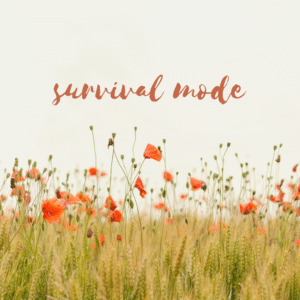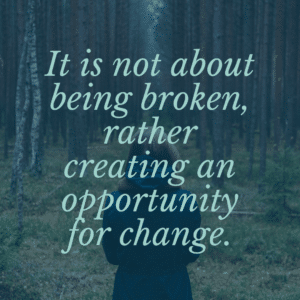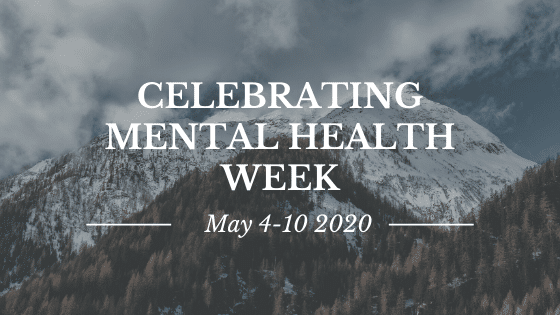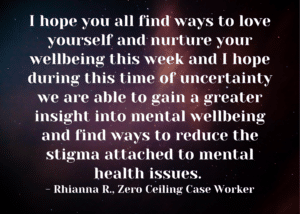May 4-10 is the Canadian Mental Health Association’s Mental Health Week. To celebrate, we are bringing you another letter from Rhianna, our Case Worker. She connects with our participants nearly every day, and we wanted her to share what mental health and wellbeing means for our Work 2 Live participants.
Happy Mental Health Week.
Mental wellbeing is really at the heart of my work at Zero Ceiling. For the majority of us the last few weeks have shifted and challenged our mental wellbeing by changing our routines, creating a sense of long-term uncertainty and brought up emotions that we may not have experienced in this way before. (Read Rhianna’s last post on how our routines have changed in the face of COVID-19 restrictions.)
 What we know is typically when people feel unsafe and experience ongoing instability their bodies adapt to this and we transition into survival mode. Most of us know this in terms of the fight, flight or freeze response. If we are exposed to repetitive or continuous instability in our lives our bodies may shift so that even when the stability begins to return, we remain in survival mode.
What we know is typically when people feel unsafe and experience ongoing instability their bodies adapt to this and we transition into survival mode. Most of us know this in terms of the fight, flight or freeze response. If we are exposed to repetitive or continuous instability in our lives our bodies may shift so that even when the stability begins to return, we remain in survival mode.
Many of our participants have experienced trauma and instability and when they come to our program are in survival mode. Understandably this significantly impacts on their mental wellbeing. For some they may be experiencing ongoing anxiety. This could be social anxiety impacting their desire to form relationships, and for others their body may disconnect, leading to feelings of isolation, depression and a lack of self worth. All these responses are normal and understandable when living in survival mode. It is not about being broken, rather creating an opportunity for change.
Once people feel safe and stable, we can look at ways to strengthen wellbeing, using individual strengths such as resilience, problem solving, creativity and adaptability and accessing support services to allow individuals to grow and find their potential.
 We have an amazing team of support options in Whistler, including our Zero Ceiling staff, the Vancouver Mental Health and Addictions Team, Whistler Community Services and caring supportive individuals and businesses. When individuals can connect and gain a sense of community, this alone strengthens mental wellbeing, we share values and experiences, and this is shown to link in with feelings of hope for the future.
We have an amazing team of support options in Whistler, including our Zero Ceiling staff, the Vancouver Mental Health and Addictions Team, Whistler Community Services and caring supportive individuals and businesses. When individuals can connect and gain a sense of community, this alone strengthens mental wellbeing, we share values and experiences, and this is shown to link in with feelings of hope for the future.
The small acts of kindness and the large ones I have seen over the last 6 weeks have been incredible and certainly strengthen our community and its connections with individuals. I am deeply grateful for our unique community; you are an inspiration and source of mental wellbeing. I hope you all find ways to love yourself and nurture your wellbeing this week and I hope during this time of uncertainty we are able to gain a greater insight into mental wellbeing and find ways to reduce the stigma attached to mental health issues.
xx Rhianna


